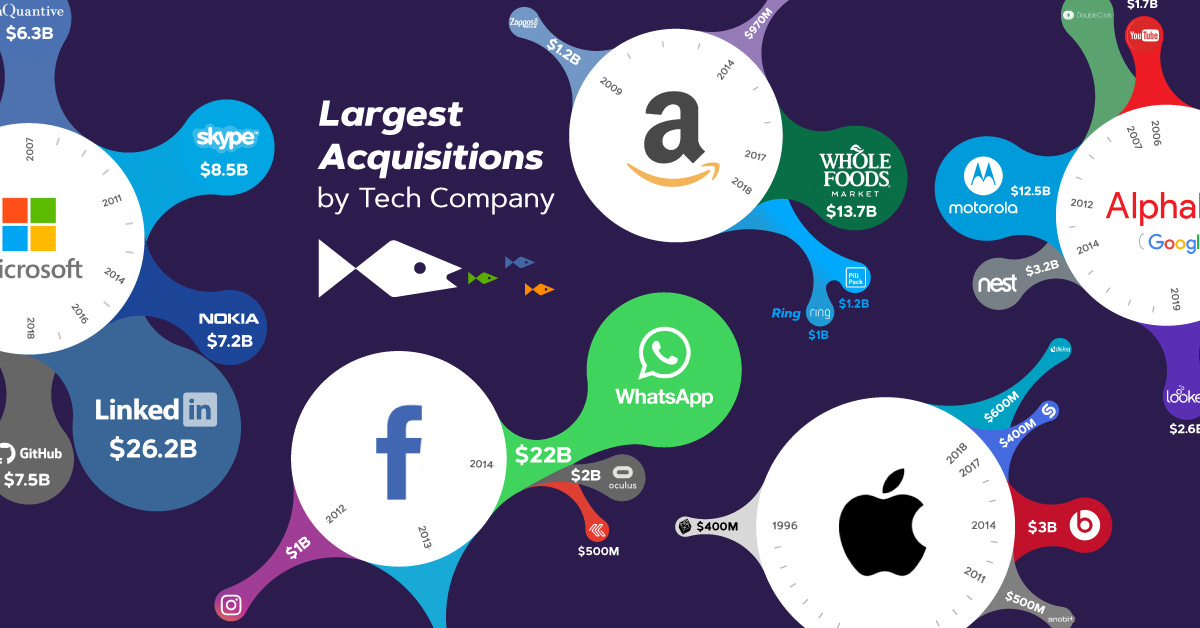2020: Big tech finally is made answerable
Thoughts on how different governments are finally making Google and Facebook accountable
Mid last month when most of the vaccine players were finding the right percentage of their success, UK tech regulators took the baby steps to finally limit the power of big tech. Or let’s just say Google and Facebook.
That doesn’t mean Amazon, Microsoft, Twitter, or Apple are saints.
UK watchdog launches DMU to limit the power of big tech
Last year during this time UK competition watchdog said there is a strong argument for introducing regulations to tackle the dominance of Google and Facebook, including potentially opening up search engine data to rivals and bringing in rules to give consumers greater control over their data.
The Competition and Markets Authority found that for the past decade, Google has controlled more than 90% of the UK’s £6bn search advertising market, while Facebook accounts for almost half of the £5bn internet display advertising market.
In the latest move, the UK government has announced a new tech regulator will work to limit the power of Google, Facebook, and other tech platforms. The CMA will gain a dedicated Digital Markets Unit, empowered to write and enforce a new code of practice on technology companies which will set out the limits of acceptable behaviour.
Oliver Dowden, the digital secretary, said: “There is growing consensus in the UK and abroad that the concentration of power among a small number of tech companies is curtailing the growth of the sector, reducing innovation and having negative impacts on the people and businesses that rely on them. It’s time to address that and unleash a new age of tech growth.”
The new rules will affect only those companies deemed to have strategic market status or SMS. Although no tech firms have been officially awarded that status yet, the documents state that the DMU’s “prioritisation criteria” for companies to be included will be those that earn more than £1bn in UK revenues or £25bn globally. And the maximum penalty for breach should be 10% of worldwide turnover, reports The Guardian.
Facebook CEO Mark Zuckerberg is not happy with the new law of curbing the powers of the world’s biggest social network which has also transformed into an open world of fake news, hate, violence, and conspiracy theories.
Bureau of Investigative Journalism reveals that Mark has threatened to withdraw investment from the UK if the government did not soften its “anti-tech” stance towards his company.
The UK government has just followed the footsteps of the Australian government. Sort of.
Australia tables the world’s first media legislation
Earlier this week the Australian government tabled the world’s first media legislation in parliament that it will force Google and Facebook to negotiate a fair payment with news organisations for using their content in Facebook’s newsfeed and Google’s search.
The law has been designed to address the loss of advertising revenue from traditional media companies to digital behemoths. Google made $4.3bn in advertising revenue in Australia last year and Facebook made $0.7bn, according to documents filed with the Australian Securities and Investments Commission.
After an 18 month inquiry, the Australian Consumer and Competition Commission found a bargaining power imbalance between news media organisations and the large digital platforms and recommended that codes of conduct be negotiated to govern their commercial deals.
While traditional media companies are going to benefit from this rule, especially News Corp Australia, the firm has campaigned aggressively for the code. If Google and Facebook refuse to negotiate they will have to pay a penalty of $10m, or 10% of annual Australian turnover, or three times the benefit obtained, whichever is the greater.
Google and Facebook fear that this could set a global precedent. Facebook has threatened to block Australians from sharing news. However, Google has decided to walk the campaign mode asking users to fight the proposed legislation.



Meanwhile, a recent Guardian Essential poll found that a majority of Australians wanted the government to regulate the digital giants, and voters also supported moves to make Facebook and Google pay for mainstream media content.
The French government has already walked the same path that Aussies are doing now. In the first quarter of 2020, France’s competition authority has ordered Google to negotiate with publishers to pay for the reuse of snippets of their content — such as can be displayed in its News aggregation service or surfaced via Google Search.
The authority cites Google’s unilateral withdrawal of “longer display article extracts, photographs, infographics and videos within its various services (Google Search, Google News, and Discover) unless the publishers give it free authorization” as unfair behavior.
A handful of individual EU Member States, including Germany and Spain, had previously passed similar laws covering the use of news snippets — without successfully managing to extract payments from Google, as lawmakers had hoped. But France is not backing off and considers Google damaging the press sector.
Simultaneously Guardian reported that Facebook is going to pay mainstream UK news outlets millions of pounds a year to license their articles. Facebook declined to comment on the amount of money it is putting into the scheme, but some publishers are privately expecting to make millions of pounds a year from the multi-year deals they have signed with the social network.
This development is connected to Facebook pushing its News product but this time by offering publishers an assured sum of money. Last time it did the same with guaranteed views and engagement.
US is curbing big tech’s power
In October, a report submitted by the House subcommittee said that Apple, Amazon, Facebook, and Google—have monopoly power that threatens core economic and political liberties.
The subcommittee accuses Apple of using its control over mobile apps to squeeze excessive fees out of app developers, who often pass those costs along to users. Amazon allegedly uses its dominant share of online retail to unfairly compete against the outside sellers who use its platform—37 percent of whom, the subcommittee finds, derive all their income through Amazon.
The case against Google focuses on the company’s use of its dominant share of the search market to entrench its own position, advantage its own products, and take over other markets like maps and advertising.
As for Facebook, the report contains explosive internal emails, some revealed for the first time, showing that the company’s executives openly discussed acquiring companies, including Instagram and WhatsApp, in order to snuff outgrowing competitors.
The problems of Facebook have just got doubled. The US government and a coalition of 48 states and districts have filed parallel lawsuits against Facebook in a major antitrust offensive that accused the social networking giant of anticompetitive behavior and could ultimately force its breakup.
“For nearly a decade, Facebook has used its dominance and monopoly power to crush smaller rivals and snuff out competition, all at the expense of everyday users,” said New York’s attorney general, Letitia James.
“Today, we are taking action to stand up for the millions of consumers and many small businesses that have been harmed by Facebook’s illegal behavior. Instead of competing on the merits, Facebook used its power to suppress competition so it could take advantage of users and make billions by converting personal data into a cash cow.”
The US Federal Trade Commission (FTC) has launched another suit alleging that Facebook engaged in a “systematic strategy” of anticompetitive conduct. The FTC is seeking a permanent injunction in federal court that could force Facebook to sell off Instagram and WhatsApp.
Google has its own set of antitrust charges by the justice department.
Did you just say that you are having a bad year?
India which is almost there to finally have it’s own Personal Data Protection Bill will throw some stiff challenges for the big tech. Facebook which just announced its revenues for the financial year 2019-20 at Rs 1,277 crore in India has its ongoing set of problems related to political bias.
Self-regulation - largely a fantasy
In 2015, Maelle Gavet French businesswoman, author, and entrepreneur wrote on WIRED wrote, “When a handful of tech giants are gatekeepers to the world's data, it's no surprise that the debate about balancing progress against privacy is framed as "pro-data and, therefore, innovation" versus "stuck in the Dark Ages". She further said,
“The history of business has shown that companies usually only regulate themselves if they're forced to by legislation, or out of self-interest -- often in the shape of a marketable message that will help sell more products.
Not only is self-regulation largely a fantasy, but repeated scandals across multiple industries have proved that companies are fundamentally incapable of self-regulating for the greater good.”
At the start of the year, Google CEO Sundar Pichai called for governments to regulate AI. He even publicly supported the European Union’s proposal to temporarily ban facial recognition.
Timnit Gebru who co-ran the Google Ethical AI team was recently fired by Google. The details of the email exchanges that led to her firing were revealed by Casey Newton.
Google says she resigned.
According to Azeem Azhar, this was triggered by a research paper that Gebru and others had written which “highlighted the risks of large language [AI] models”. Such models are increasingly used by Google in its core search business.
This is the reason why we need to have big tech answerable. The big tech is no more networks or platforms that make our life easy. They control it, govern it, and monitor it.
Now you might ask who will regulate the governments who might use the data and target activists, whistleblowers, and common citizens.
We are doomed.





